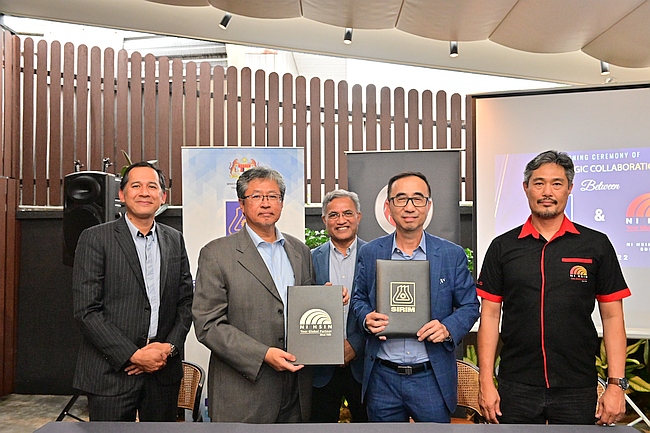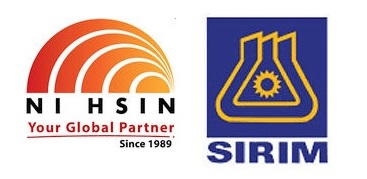Group to set up Lithium-Ion Battery Recycling Plant
Ni Hsin EV Tech Sdn. Bhd., a wholly-owned subsidiary of Main Market-listed Ni Hsin Group Berhad (formerly known as Ni Hsin Resources Berhad (Bursa: NIHSIN, 7215)), today signed a Strategic Collaboration with SIRIM Berhad to promote co-operation between the Parties in the following areas:

(a) setting up of a Lithium-Ion Battery Recycling Plant in Malaysia through Public-Private Partnership (PPP) funding model;
(b) providing an eco-system for a circular economy model in mitigating the impact on the environment as a result of Lithium-Ion Battery being processed illegally in Malaysia;
(c) potentially setting up a Lithium-Ion Battery manufacturing plant in Malaysia; and
(d) introducing a Lithium-Ion Battery Recycling policy working with the Government of Malaysia. (collectively the “Project”)
Khoo Chee Kong, Managing Director of NH EV TECH, said: “This Strategic Collaboration with SIRIM is an extension of our quest for greater participation in the green economy. Having successfully launched our EV motorcycles last month we are looking forward to unlocking another piece of the environmental puzzle. As the world has grown to love and depend on the power and convenience brought by lithium-ion batteries (LIBs), their manufacturing and disposal have increasingly become subjects of political and environmental concerns. Most discarded LIBs eventually are landfilled or stockpiled, contaminating the land while wasting energy and non-renewable natural resources. If not recycled and reused, LIBs will exert massive environmental impacts and accelerate the depletion of mineral reserves. It’s not only environmental pollution that is a problem. During the end-of-life stage of LIBs, poor handling and disposal could increase the risk of fire or poisoning. In the coming years, disposing of huge numbers of batteries from electric vehicles is going to be the real challenge. There is now a need for qualified e-waste recyclers that can handle and recycle LIBs safely and responsibly.”
“The setting up of a Lithium-Ion Battery Recycling Plant is the right step in furthering Ni Hsin’s green mission in support of the government’s commitment towards a more sustainable, resilient and inclusive development in line with the United Nations’ 2030 Sustainable Development Goal (SDG). The collaboration also aims to create an eco-system for a circular economy model in mitigating the impact on the environment and to spearhead the formation of a Lithium-Ion Battery Recycling policy working with the Government of Malaysia. The current LIB recycling market is estimated to be worth approximately $1.7 billion and is expected to increase significantly over the next ten years. In the ASEAN region there is only one such recycling facility in Singapore with a recycling capacity of 14 tonnes of Lithium-Ion batteries per day. Being one of the first movers in this region makes Ni Hsin more attractive to investors who are beginning to consider sustainability factors in their investment decision-making process.”
“We are honoured to work with SIRIM in this green Project who, with their vast knowledge and innovative technical expertise, will be a valuable partner ensuring the success of this green project.” SIRIM President and Group Chief Executive Officer, Dato’ Indera Dr Ahmad Sabirin Arshad said, “Under the green technology master plan 2030 of Malaysia, several strategies were outlined to create a low-carbon and resource efficient economy, thus, in complementing this master plan, SIRIM will be embarking on various projects towards enhancing and promoting sustainability in line with the Sustainable Development Goals (SDGS).”
“SIRIM is ever ready to work with any parties who are keen to explore any form of recycling business where we can contribute in terms of the latest technologies towards building our local recycling capabilities for e-waste”, said Dato’ Indera Dr Ahmad Sabirin Arshad.
The SIRIM-Ni Hsin Lithium-Ion Battery Recycling Pilot Plant will be fully operational in 2023 with annual recycling capacity of 550 tonnes of lithium-ion batteries. For a start, the output will be sold to lithium-ion batteries manufacturers in the form of black mass. “Under this collaboration both companies will focus on the recovery of precious metals such as lithium and cobalt in 2024 and embark on lithium-ion battery manufacturing 2025, when the volume by processing more lithium-ion batteries from other nations” he added.
Ni Hsin Group Berhad: NIHSIN [Bursa: 7215] [RIC: NHSN:KL] [BB: NHR:MK], http://www.ni-hsin.com/
















